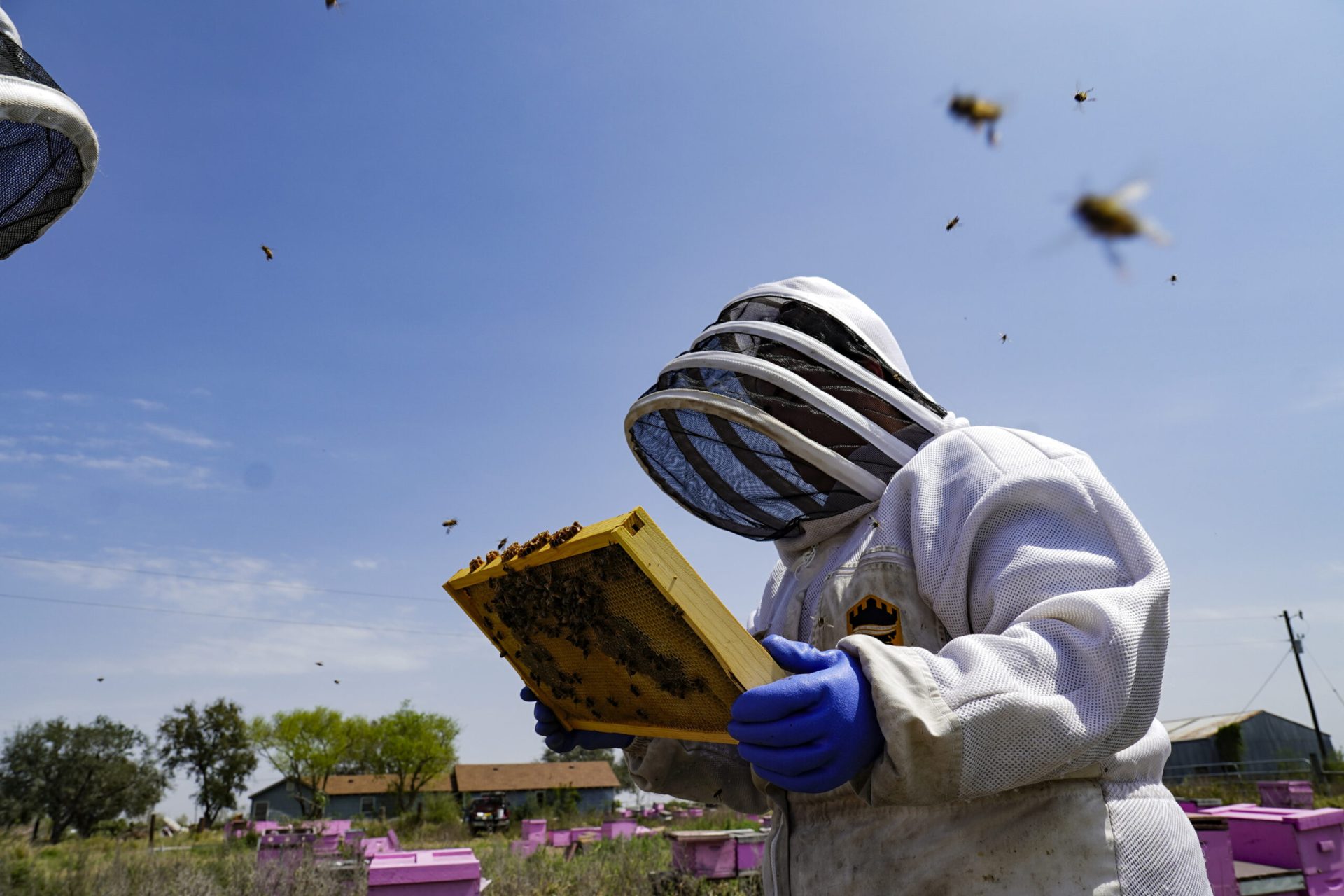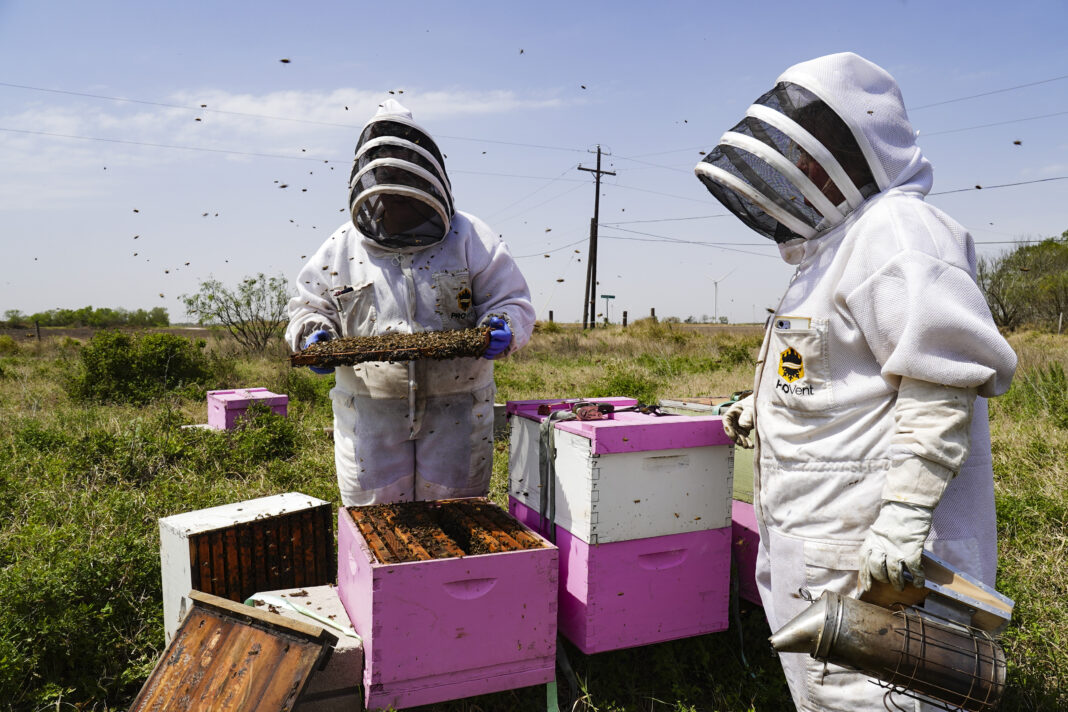This is one hobby where you can get your buzz on.
Texas A&M AgriLife is offering a course called Beekeeping 101 to give novices a taste of what it’s like to form a partnership with one of nature’s most industrious little beasts, the honeybee.
The in-person course will be held in San Antonio on March 25, but that seminar is fully booked. AgriLife does offer an online course that will be held March 28-29 and April 6-7. The cost of four sessions of the two-hour online programs is $45.50.
“This program is meant for those with little to absolutely no experience with beekeeping,” said Molly Keck, AgriLife Extension entomologist and Beekeeping 101 instructor, Bexar County. “We’ll get you started, teaching the basics of beekeeping to get you prepared to have your own hives. You’ll learn what to expect those first few years as a beekeeper.”
The Beekeeping 101 course will cover honeybee biology, beekeeping equipment, suit options, managing a hive, pests and disease management of honeybees. Both the in-person and online courses cover the same material.
So what’s not to like? Bees do all the work, they feed themselves, and all you have to do is scoop out the delectable raw honey the busy bees produced, right?
“I think it’d be a great introduction, the only worry I have is if you’re not in a hive, it’s harder. I mean if you’re doing an online course, great, you know what to expect,” said Dawn Johnston, who along with daughter Devin runs the bee-removal service R9 Hive and Honey in Lyford.
“But when you open hives sometimes, especially where we are in the Valley — and I don’t want to dissuade anybody from beekeeping — but people like to try and catch swarms, they’re like ‘Oooh, free bees!,’” she added. “But when you’re in the Valley, free bees are Africanized bees, or can be. So I would always say the course is great, yes, but also get a bee mentor, somebody who has more experience that can walk you through what you’re looking at, the sights, the smells, the sounds.”
Danger swarms
East African lowland honeybees were brought to Brazil In 1956 by a researcher seeking to improve honey output in tropical regions by crossbreeding them with varieties of European honeybees. A year later, 26 swarms escaped quarantine and went rogue.
The theory since is that as they interbreed with established and gentler honeybees, the aggressiveness will eventually be bred out of them.
But that doesn’t seem to be the case as the bees continue to push north.
Called “killer bees” by some, it’s perhaps an exaggeration, but nevertheless they have caused human deaths in Texas by swarming victims and stinging en masse.
“Bees are kind of funny, they’re like we are,” Johnston said. “Some people are really nice, and some people are real jerks, you just never know who you’re going to meet up with. They have attitudes and come in different colors and shapes just like we do. It really depends on the queen and her attitude how the hive’s going to be. So if she’s cantankerous, they’re cantankerous.”
European honey bees can sting, too, when protecting their hive.
“Africanized bees just tend to go to guns quicker,” Johnston said.
The reality of almost assuredly running into Africanized bees here in the Rio Grande Valley makes getting a beekeeping mentor that much more important, she says.
“I always recommend that you find a local bee club,” Johnston said. “We do have one in the Valley, and/or a a local beekeeper and say, ‘Hey, can I pick your brain, can you take me into a hive?’ And I always offer that just so that people know what they’re going to get into. It’s much safer that way.”

Where to set up
The online AgriLife course covers a lot of the basics about honey bee life cycles, its caste system, where to put a hive and how to understand what’s going on inside the hive.
But if you live inside city limits, there may be ordinances against beekeeping, and it might not be fair to the bees if they don’t have enough room, and the flowers and blossoming trees on which to forage.
“It depends on the city ordinance and where you are. If the city says no, no means no,” Johnston said. “But that doesn’t mean you can’t be a beekeeper. You may have a friend who has got two or three acres out of town, or you know somebody who’s got a ranch, a couple hundred acres you can put bees on.”
“It just depends on what you want to do with them,” she added. “If you’re going to catch a swarm and stick it in your backyard in the middle of a cul-de-sac in town, and then expect that these bees aren’t going to visit your neighbors or irritate your neighbors — wrong! You have to know what you’re getting into.”
So the patio deck at the apartments is probably out?
“Probably.”
Costs can be high
Johnston cautions that beekeeping, as rewarding as it may be, isn’t cheap.
She has about 150 hives of mostly rescued bees which have been taken out of people’s homes or yards in the course of operating her business. A single hive can hold up to 50,000 bees, and those bees, at least the feral ones, need about 264 pounds of honey a year just to survive.
“It’s very expensive to keep bees. If I have to replace the queen, one queen is $40. And that doesn’t include the overnight shipping because they can’t just put her in the mail and hope she gets there,” Johnston said. “And there’s no refund on it. If she arrives at your house dead, no, you don’t get your money back.”
The boxes for the hives start at around $150, and that’s for a relatively cheap model. And the protection suit?
“My suit is $180 and we go through them a lot,” she said. “If a suit gets a hole in it, trust me, a bee is going to find it. And they end up in your suit going ‘we’re not happy with you.’”
“I want somebody who’s interested to know this is what they want to do, because it is a lot of work. And if one of those swarms comes by and takes out your Italian queen and puts their Africanized queen in there, you need to know it. Just doing an online school, it gives you a lot of the basics, but it doesn’t give you the practical knowledge.”
For a taste of that practical knowledge, Johnston says give her a call.
“If you want to come out and poke your head into a hive of bees just to see what it’s like, great! I’ve got suits. Come on, let’s go!”
Beekeeping 101
WHAT: Beekeeping 101 for beginners
WHERE: Online
WHO: Texas A&M AgriLife
WHEN: Four two-hour programs, March 28-29, April 6-7, 6-8 p.m.
COST: $45.50
REGISTER: https://agrilifelearn.tamu.edu/s/product/beekeeping-101/01t4x000002ciQP
Confronted by bees? Read about the do’s and don’ts if the situation arises:




